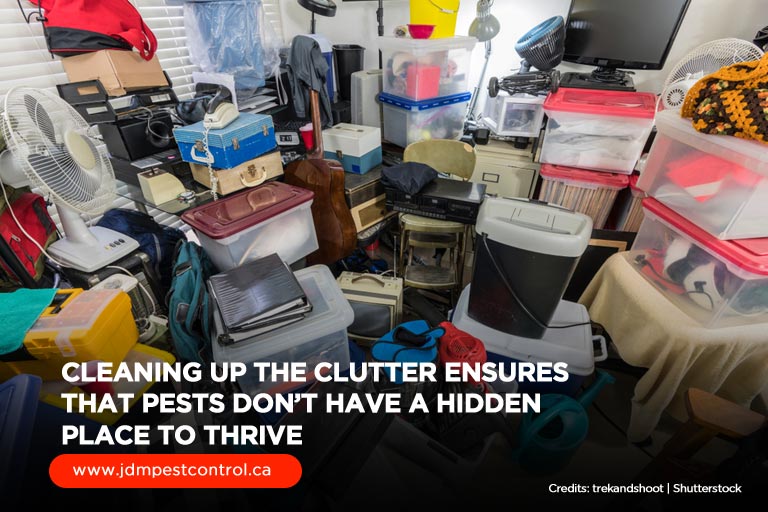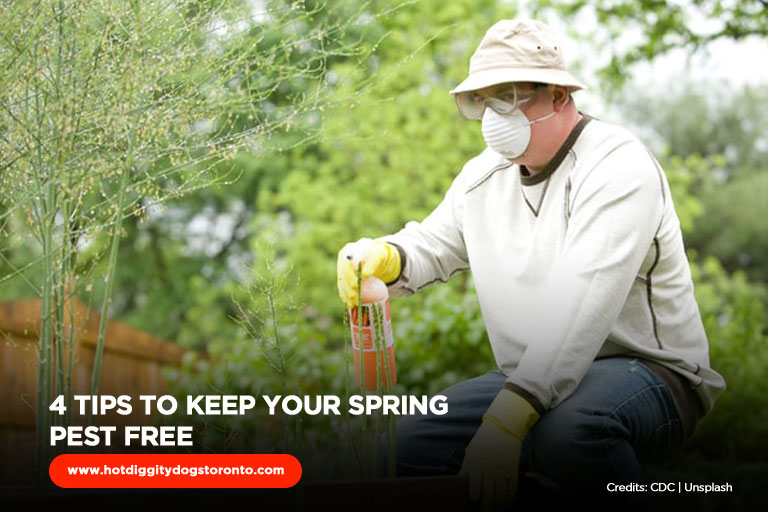As the flowers blossom and the weather improves, homeowners will begin to prepare to-do lists to assist them in completing their spring cleaning. While dusting and sweeping are standard spring cleaning procedures, our spring cleaning advice is for homeowners to include proper pest-proofing in their to-do list.
Although spring pests may appear to be a minor annoyance, warm-weather invaders such as flies and termites can be hazardous to both people and property. Here are some of the common spring pests and what you can do to keep them away.
Pests in the Spring
Below are some of the most common pests you’ll find in spring:
- Ticks
Ticks are known for transmitting diseases including Rocky Mountain spotted fever and Lyme disease. These pests prefer to lurk in thick grass or shrubs, as well as near roads or paths, waiting for a host to pass by, so make sure your yard is well-kept and mowed.
To lower your chances of developing an illness, you should remove a tick as soon as you notice one on your body. When you’re outside, wear long sleeves and pants and use insect repellent with at least 20% DEET to reduce your chances of getting ticks into your home.
- Fleas
Fleas are well known for aggravating pets such as cats and dogs, but they can also bite humans and carry diseases. Fleas can cause allergic dermatitis in pets and can also transmit the rare bubonic plague and tapeworm.
Maintain a clean home by vacuuming frequently and washing bed linens on a regular basis to keep fleas out of your home and away from your family and pets. Fleas prefer to hide in long grass, so keep your yards and lawns well-kept outside. Fleas can also feed on mice, so get rid of any places where rodents might hide, such as overgrown shrubs or trees. Perform flea inspections after pets have been outside. You should also give your pets routine bathing and grooming and take them on regular visits to the veterinarian.
- Ants

More than 20 ant species have been identified to infest houses, schools, and businesses. Although ants may appear to be nothing more than a nuisance, they can cause serious problems such as food contamination and costly property damage.
Keep ants out this spring by sealing holes and openings that enable them to enter your home. Keep all sweets in closed containers and dispose of rubbish on a regular basis to keep ants out of the kitchen. Additionally, keep tree branches and other vegetation clipped back from the house, as ants frequently utilize these as highways into the house.
- Cockroaches
Cockroaches are dangerous to your health. They can spread diseases like E. coli. If you find one cockroach in your home, there are often several more hidden in the cracks and crevices. Cockroaches, like several other vermin, are drawn to damp areas and food sources.
To keep cockroaches out, vacuum frequently and store your food in airtight containers. Seal any cracks or fissures around the house, and make sure there’s no dampness in the attic, basement, or crawl space. Kitchens and bathrooms should be given special attention because they are particularly prone to cockroach infestations.
4 Ways to Keep Pests Out
Here’s what you can do to avoid pest infestations:
1.Eliminate stagnant water
The majority of pests love damp, humid environments. Furthermore, several pests, like mosquitoes, require standing water to reproduce. Pests will be less likely to take up residence in and around your home during the summer months if you decrease the amount of standing water and moisture in and around your property.
Look for sources of standing water outside your property, such as birdbaths, wheelbarrows, blocked gutters, empty flower pots, and buckets. Inside your home, fix any leaky pipes or faucets, and pay special attention to areas that can collect moisture. If necessary, consider using a dehumidifier.
2.Don’t feed the pests
While we advocate feeding your pets, make sure they don’t leave a mess behind. For hungry pests, pet food, birdseed, and dry food items are all attractive nibbles. Keep dried foods and grains in sealed, pest-proof containers in your pantry.
The same may be said of pet foods. Clean the areas where your pets feed and dump bowls after your pets have eaten. After a BBQ, hose down the outdoor areas. Finally, if your children snack somewhere other than the kitchen, make sure they clean up after themselves.
3.Check your electrical equipment
Pests looking for a warm spot to reside in colder weather prefer electrical boxes. Examine the insides of electrical boxes for any living or dead insects. Even if you don’t think there’s a charge running through it, check for damage before touching any wire. Damaged wires can potentially cause overloading and shorting, as well as damage to associated equipment. Worst of all, exposed cables can overheat and ignite, resulting in potentially fatal electrical fires.
Rodents enjoy gnawing on electrical wires to sharpen their teeth. Chewing plastic, particularly the soft plastic cover over cords, exposes the wire inside. They may even damage the cable itself, allowing the electrical current to flow freely. Electrical damage caused by rodents is particularly dangerous since it sometimes goes undiscovered. Notify a pest control professional if you find anything amiss.
4.Clean up all the clutter

All of the things we keep in our houses provide plenty of hiding spots for rodents and other pests, like bugs. They like to hang out in basements, attics, and garages that are typically left unattended for lengthy periods of time. Remove any items you no longer need from your home to keep it clutter-free. To keep pests away and your valuables safe, store everything in air-tight plastic containers.
Having a lot of stuff also makes it more difficult to clean beneath and behind things, which are prime nesting grounds for many pests. Even professionals may find it difficult to control bugs as a result of this. Getting rid of clutter can help you get rid of the pests in your home.
Consult the Experts
Following the spring cleaning tips above will help to prevent pests in and around your home. If you do find yourself dealing with pests as the weather gets warmer, JDM Pest Control is here to help.
The best way to control pests is with prevention. By being proactive early in the year, you can keep your home pest-free throughout the year. Contact us at 1-416-729-3568 or send us an email at joe@jdmpestcontrol.ca
